Want to save the environment? Try ending abortion.
Here's the fine print in Pope Francis' ambitious environmental vision
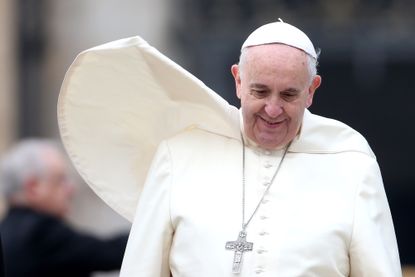

Everybody is talking about the Pope's new environmental encyclical, even though there isn't much that's unusual about it.
In fact, it's a document so perfectly in line with usual Catholic teaching that the most illuminating piece of commentary on it I could find was perhaps this 2009 column by The New York Times' Ross Douthat on his predecessor's encyclical "Caritas in Veritate."
But, then again, it's that very usualness that makes it unusual, since Catholic teaching is, itself, so very different from the categories we usually ascribe to it. The Pope's encyclical is very much a Catholic vision of care for creation, which makes it stand out from either pop environmentalism (which sometimes veers too close to Gaia worship) or conservative indifference (or what looks like it) to care for the environment.
Subscribe to The Week
Escape your echo chamber. Get the facts behind the news, plus analysis from multiple perspectives.

Sign up for The Week's Free Newsletters
From our morning news briefing to a weekly Good News Newsletter, get the best of The Week delivered directly to your inbox.
From our morning news briefing to a weekly Good News Newsletter, get the best of The Week delivered directly to your inbox.
In line with a famous Biblical phrase, Catholic theologians and pastors over the years have emphasized the "seamless garment" of the Church's teaching — that every piece of it is connected to the others so that they form a coherent whole, making it impossible to take out one piece without ruining the rest. In contemporary politics, where we bracket things between left and right, "social issues" and "economic issues," that is a sorely needed corrective.
Here's an example of the seamless garment at work: In the encyclical, Pope Francis reiterates his and the Church's opposition to abortion, birth control, and population control, and warns that concern for the environment must not be used as a pretext to support these policies. Francis' vision is of a "human ecology," to reprise a phrase from Pope John Paul II. The Biblical vision is that man was created by God as the centerpiece of His creation, and as its caretaker and steward. This means that man has a duty to care for creation and not destroy it, seeing it as a trust, not property. But it also means that caring for creation must not come at the cost of human dignity.
While this may seem theoretically consistent, it might also seem like Pope Francis is asking us to square a circle. If — as Francis warns — the situation is so dire, our resources so limited, our current consumption patterns so unsustainable, how are we to care for creation and at the same time have the levels of global population growth that Catholic teaching plainly implies?
This is not a new question. One reason — not unjustified historically — many conservatives distrust environmentalists is precisely because of their zero-sum view of the world, which seems to imply a non-humanist belief in population control.
But there is a way to square the circle.
In the 1950s, humanity was perhaps headed for a Malthusian nightmare of food scarcity and famine. The way this was avoided was — famously, perhaps, but not nearly famously enough — through the Green Revolution, a set of tremendous advances in agricultural technology that boosted yields and allowed us to feed ourselves reliably. (Today, famines, when they do exist, are more the result of political causes, like war or corruption, than an inability to produce food.)
The ensuing debate over overpopulation saw two scientists face off: The now-discredited Paul Ehrlich, and the (not-coincidentally, perhaps, Christian) economist Julian Simon. Ehrlich famously wrote that a "population bomb" was going to kill hundreds of millions of people by the 1970s, while Simon believed, in the words of his best-known book, that the ultimate resource is people. Simon won their bet — literally.
We think of oil as a resource, but oil was just black stuff in the ground until somebody came up with a way to use it, and somebody came up with a way to extract it, refine it, ship it, and so on. Oil is a pollutant, but before we came up with the inventions to turn it into a resource, we used wood and coal, which were worse on the environment and worse as energy sources.
Our only core resource, as a civilization and as a human family, is our capacity to invent a better future for ourselves. A future in which we use safe pebble-bed nuclear reactors to power our grid and fuel our fuel-cell cars and feed ourselves with vertical farms might or might not be possible. But if it happens, it is only because thousands of humans came together to make it possible.
And that, in turn, will only be possible if humans, well, exist. It's striking to consider that, for example, both Steve Jobs and Jeff Bezos were adopted. Perhaps innovators, by definition marginal people, are found more among "marginal" children, those who were not wanted. It's far from insane to consider the possibility that working vertical farms or pebble-bed reactors or efficient solar panels or a cure for cancer — or, for that matter, countless amazing artistic and cultural creations — might have come from someone's third or fourth child that they decided not to have. This idea, too, is deeply Biblical and Catholic, since Christian tradition emphasizes that man, being made in the image and likeness of God, is also a creator, and exercises his calling to God's service not in a slavish way but through creativity.
Historically, phases of technological innovation are typically preceded by phases of population growth. England's Industrial Revolution was preceded by the Agricultural Revolution, which led to an increase in population and density in England, which the Industrial Revolution then boosted, promoting innovation, and so on in a virtuous cycle.
Previously, the thriving era of the High Middle Ages and Renaissance was preceded by innovations in agriculture which increased yields to much higher than what the Romans were able to, breaking Europe out of the Malthusian trap that caused the Fall of the Roman Empire, allowing Western civilization to survive and flourish.
If the path to innovation is through decentralized trial-and-error (and it is), then at the global level, a strategy for maximizing our innovation potential includes population growth as a necessary condition, since more population means more experimentation, and therefore more discovery.
Pope Francis seems to believe we are headed for a global disaster if we don't change the way we're doing things. Might the answer start with applying Catholic teaching?
Sign up for Today's Best Articles in your inbox
A free daily email with the biggest news stories of the day – and the best features from TheWeek.com
Pascal-Emmanuel Gobry is a writer and fellow at the Ethics and Public Policy Center. His writing has appeared at Forbes, The Atlantic, First Things, Commentary Magazine, The Daily Beast, The Federalist, Quartz, and other places. He lives in Paris with his beloved wife and daughter.
-
 Why more and more adults are reaching for soft toys
Why more and more adults are reaching for soft toysUnder The Radar Does the popularity of the Squishmallow show Gen Z are 'scared to grow up'?
By Chas Newkey-Burden, The Week UK Published
-
 Magazine solutions - December 27, 2024 / January 3, 2025
Magazine solutions - December 27, 2024 / January 3, 2025Puzzles and Quizzes Issue - December 27, 2024 / January 3, 2025
By The Week US Published
-
 Magazine printables - December 27, 2024 / January 3, 2025
Magazine printables - December 27, 2024 / January 3, 2025Puzzles and Quizzes Issue - December 27, 2024 / January 3, 2025
By The Week US Published
-
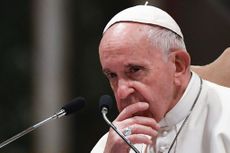 Pope Francis speaks about sex abuse scandals, Trump, and his conservatism
Pope Francis speaks about sex abuse scandals, Trump, and his conservatismSpeed Read
By Tim O'Donnell Published
-
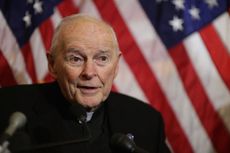 Pope Francis makes unprecedented decision in defrocking Theodore McCarrick
Pope Francis makes unprecedented decision in defrocking Theodore McCarrickSpeed Read
By Tim O'Donnell Published
-
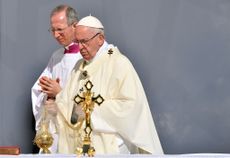 For the first time, Pope Francis publicly admits priests and bishops have sexually abused nuns
For the first time, Pope Francis publicly admits priests and bishops have sexually abused nunsSpeed Read
By Catherine Garcia Published
-
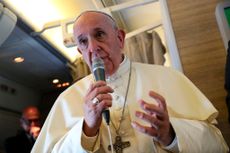 Pope Francis calls for peace in Yemen
Pope Francis calls for peace in YemenSpeed Read
By Bonnie Kristian Published
-
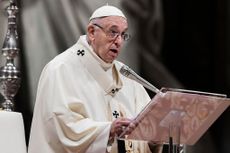 Pope Francis to abusive priests: 'Hand yourself over to human justice'
Pope Francis to abusive priests: 'Hand yourself over to human justice'Speed Read
By Kathryn Krawczyk Last updated
-
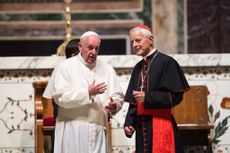 Pope Francis accepts resignation of embattled Washington Archbishop Donald Wuerl
Pope Francis accepts resignation of embattled Washington Archbishop Donald WuerlSpeed Read
By Peter Weber Last updated
-
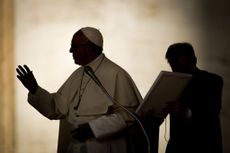 Pope Francis defrocks Chilean priest over sex abuse scandal
Pope Francis defrocks Chilean priest over sex abuse scandalSpeed Read
By Bonnie Kristian Published
-
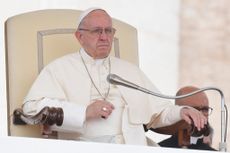 Pope Francis will meet with U.S. church leaders over clergy abuse
Pope Francis will meet with U.S. church leaders over clergy abuseSpeed Read
By Catherine Garcia Last updated